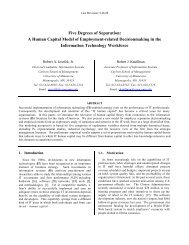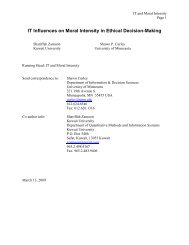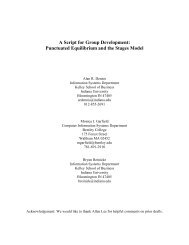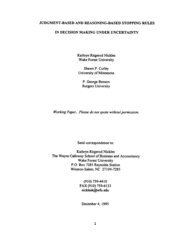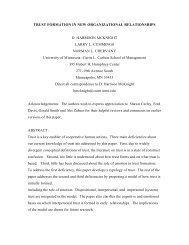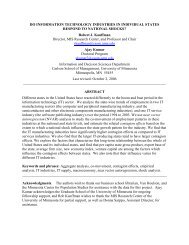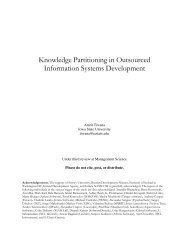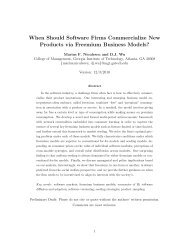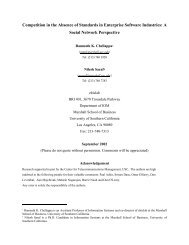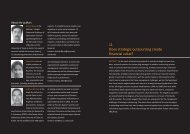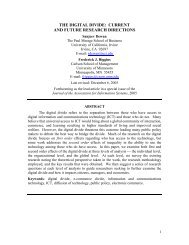Agent-Based Modeling to Inform Online Community Theory and ...
Agent-Based Modeling to Inform Online Community Theory and ...
Agent-Based Modeling to Inform Online Community Theory and ...
Create successful ePaper yourself
Turn your PDF publications into a flip-book with our unique Google optimized e-Paper software.
community activity <strong>and</strong> member commitment led <strong>to</strong> plausible yet non-obvious predictions about the ef-<br />
fectiveness of community-level <strong>and</strong> personalized moderation. Second, the availability of intermediate va-<br />
riables enabled us <strong>to</strong> examine not only the end results of design interventions but also how the results<br />
were produced, illustrating the critical trade-off between designing for informational benefit <strong>and</strong> design-<br />
ing for relational benefit. Third, in addition <strong>to</strong> providing a platform for examining different styles of<br />
discussion moderation, the model itself serves as a mid-level theory that can be further extended<br />
<strong>and</strong> applied <strong>to</strong> examine other design decisions such as leader boards, community size, <strong>and</strong> tactics<br />
for newcomer socialization, among others. Validity checks demonstrate the potential value of our<br />
model as a test bed <strong>to</strong> inform <strong>and</strong> assist online community design.<br />
4.1. Contributions <strong>to</strong> the <strong>Online</strong> <strong>Community</strong> Literature<br />
Table 4 summarizes the main findings. The first point worth noting is the largely positive effects of<br />
personalized moderation, which suggests that personalization is an under-exploited yet promising me-<br />
chanism for managing online discussion. The positive effects were especially prominent in <strong>to</strong>pically<br />
broad <strong>and</strong> high-traffic communities when members were at risk of information overload, from either an<br />
increased ratio of noise <strong>to</strong> useful information or <strong>to</strong>o many messages. In comparison, community-level<br />
moderation was less effective than either its common use or experts’ opinions would suggest. It did not<br />
encourage members <strong>to</strong> contribute more, <strong>and</strong> its positive effect on member commitment occurred<br />
only in narrowly defined groups.<br />
Insert Table 4 about Here<br />
The performance gap between personalized <strong>and</strong> community-level moderation can be partially<br />
explained by the trade-off between informational <strong>and</strong> relational benefits. As the analysis of benefits<br />
showed, one drawback of community-level moderation is that by removing off-<strong>to</strong>pic messages, it<br />
increased the benefits that members received from information exchanges but reduced benefits they<br />
received from developing online relationships. This result is consistent with research in social psy-<br />
chology showing the importance of personal self-disclosure as both a cause <strong>and</strong> a consequence of<br />
personal relationships (Collins, 1994). In comparison, personalized moderation resolved the trade-off<br />
26



